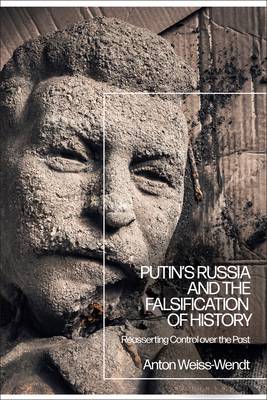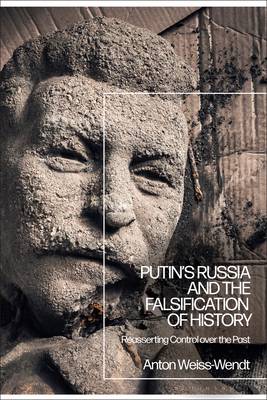
Bedankt voor het vertrouwen het afgelopen jaar! Om jou te bedanken bieden we GRATIS verzending (in België) aan op alles gedurende de hele maand januari.
- Afhalen na 1 uur in een winkel met voorraad
- In januari gratis thuislevering in België
- Ruim aanbod met 7 miljoen producten
Bedankt voor het vertrouwen het afgelopen jaar! Om jou te bedanken bieden we GRATIS verzending (in België) aan op alles gedurende de hele maand januari.
- Afhalen na 1 uur in een winkel met voorraad
- In januari gratis thuislevering in België
- Ruim aanbod met 7 miljoen producten
Zoeken
Putin's Russia and the Falsification of History
Reasserting Control over the Past
Anton Weiss-Wendt
Hardcover | Engels
€ 228,95
+ 457 punten
Uitvoering
Omschrijving
This book provides a bold examination of the political use of history in contemporary Russia. Anton Weiss-Wendt argues that history is yet another discipline misappropriated by the Kremlin for the purpose of rallying the population. He explains how, since the pro-democracy protests in 2011-12, the Russian government has hamstrung independent research and aligned state institutions in the promotion of militant patriotism. The entire state machinery has been mobilized to construe a single, glorious historical narrative with the focus on Soviet victory over Nazi Germany.
Putin's Russia and the Falsification of History examines the intricate networks in Russia that engage in "historymaking." Whether it is the Holocaust or Soviet mass terror, Tsars or Stalin, the regime promotes a syncretic interpretation of Russian history that supports the notion of a strong state and authoritarian rule. That interpretation finds its way into new monuments, exhibitions, and quasi-professional associations. In addition to administrative measures of control, the Russian state has been using the penal code to censor critical perspectives on history, typically advanced by individuals who also happen to call for a political change in Russia.
This powerful book shows how history is increasingly becoming an element of political technology in Russia, with the systematic destruction of independent institutions setting the very future of History as an academic discipline in Russia in doubt.
Putin's Russia and the Falsification of History examines the intricate networks in Russia that engage in "historymaking." Whether it is the Holocaust or Soviet mass terror, Tsars or Stalin, the regime promotes a syncretic interpretation of Russian history that supports the notion of a strong state and authoritarian rule. That interpretation finds its way into new monuments, exhibitions, and quasi-professional associations. In addition to administrative measures of control, the Russian state has been using the penal code to censor critical perspectives on history, typically advanced by individuals who also happen to call for a political change in Russia.
This powerful book shows how history is increasingly becoming an element of political technology in Russia, with the systematic destruction of independent institutions setting the very future of History as an academic discipline in Russia in doubt.
Specificaties
Betrokkenen
- Auteur(s):
- Uitgeverij:
Inhoud
- Aantal bladzijden:
- 336
- Taal:
- Engels
Eigenschappen
- Productcode (EAN):
- 9781350130531
- Verschijningsdatum:
- 3/09/2020
- Uitvoering:
- Hardcover
- Formaat:
- Genaaid
- Afmetingen:
- 156 mm x 234 mm
- Gewicht:
- 648 g

Alleen bij Standaard Boekhandel
+ 457 punten op je klantenkaart van Standaard Boekhandel
Beoordelingen
We publiceren alleen reviews die voldoen aan de voorwaarden voor reviews. Bekijk onze voorwaarden voor reviews.









